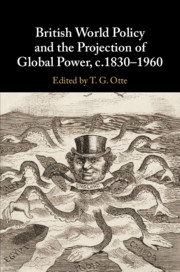Book contents
- British World Policy and the Projection of Global Power, c.1830–1960
- British World Policy and the Projection of Global Power, c.1830–1960
- Copyright page
- Dedication
- Contents
- Notes on the Contributors
- Preface and Acknowledgements
- Introduction: British World Policy and the White Queen’s Memory
- 1 The War Trade Intelligence Department and British Economic Warfare during the First World War
- 2 The British Empire and the Meaning of ‘Minimum Force Necessary’ in Colonial Counter-Insurgencies Operations, c.1857–1967
- 3 Yokohama for the British in the Late Nineteenth Century: A Hub for Imperial Defence and a Node of Influence for Change
- 4 ‘The Diplomatic Digestive Organ’: The Foreign Office As the Nerve Centre of Foreign Policy, c.1800–1940
- 5 Financial and Commercial Networks between Great Britain and South America during the Long Nineteenth Century
- 6 Britain through Russian Eyes: 1900–1914
- 7 Imperial Germany’s Naval Challenge and the Renewal of British Power
- 8 Views of War, 1914 and 1939: Second Thoughts
- 9 The Ambassadors, 1919–1939
- 10 The Tattered Ties that Bind: The Imperial General Staff and the Dominions, 1919–1939
- 11 Seeking a Family Consensus? Anglo-Dominion Relations and the Failed Imperial Conference of 1941
- 12 Imperial Hubs and their Limitations: British Assessments of Imposing Sanctions on Japan, 1937
- Index
12 - Imperial Hubs and their Limitations: British Assessments of Imposing Sanctions on Japan, 1937
Published online by Cambridge University Press: 06 September 2019
- British World Policy and the Projection of Global Power, c.1830–1960
- British World Policy and the Projection of Global Power, c.1830–1960
- Copyright page
- Dedication
- Contents
- Notes on the Contributors
- Preface and Acknowledgements
- Introduction: British World Policy and the White Queen’s Memory
- 1 The War Trade Intelligence Department and British Economic Warfare during the First World War
- 2 The British Empire and the Meaning of ‘Minimum Force Necessary’ in Colonial Counter-Insurgencies Operations, c.1857–1967
- 3 Yokohama for the British in the Late Nineteenth Century: A Hub for Imperial Defence and a Node of Influence for Change
- 4 ‘The Diplomatic Digestive Organ’: The Foreign Office As the Nerve Centre of Foreign Policy, c.1800–1940
- 5 Financial and Commercial Networks between Great Britain and South America during the Long Nineteenth Century
- 6 Britain through Russian Eyes: 1900–1914
- 7 Imperial Germany’s Naval Challenge and the Renewal of British Power
- 8 Views of War, 1914 and 1939: Second Thoughts
- 9 The Ambassadors, 1919–1939
- 10 The Tattered Ties that Bind: The Imperial General Staff and the Dominions, 1919–1939
- 11 Seeking a Family Consensus? Anglo-Dominion Relations and the Failed Imperial Conference of 1941
- 12 Imperial Hubs and their Limitations: British Assessments of Imposing Sanctions on Japan, 1937
- Index
Summary
Britain’s gunboat diplomacy in the mid-nineteenth century built an important imperial presence in China. The First Opium War and the subsequent Arrow War opened China to trade, especially to opium imported from British-controlled India, and compelled the Qing Dynasty to sign the Treaty of Nanking (1842) and the subsequent Treaty of the Bogue (1843) – the unequal treaties. The treaties granted Britain extra-territorial rights, ceded Hong Kong to Britain, required the Qing to pay indemnities, and ended Qing control over their tariffs on foreign trade. Most importantly, they ended the Qing Dynasty’s Canton trade system that had attempted to put strict limits on foreign trade. Over the following decades, British investors built many of the transportation and commercial industries in developing a Chinese economy more integrated into the world trade system. Major British companies such as Jardine & Matheson, Hongkong and Shanghai Bank, Butterfield & Swire, John Swire & Sons, British-American Tobacco, and the Asiatic Petrol Company played a central role in many of China’s most important industries, from banking, shipping lines on China’s navigable rivers, railroads, chemical industries, soap-making, breweries, mining collieries, lumber, cotton and woolen mills, dockyards, cold storage and warehouses, to hotels, while many British subjects owned small property holdings such as private residences and rooming houses. Investors had placed the majority of this investment in the vicinity of Shanghai.
- Type
- Chapter
- Information
- Publisher: Cambridge University PressPrint publication year: 2019

